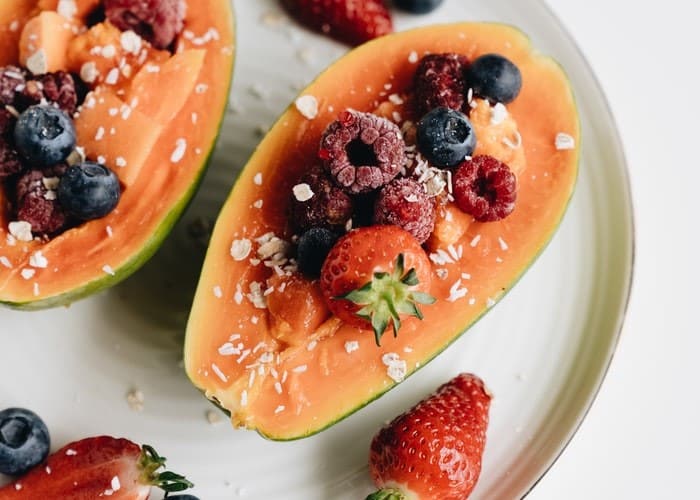
Pregnant women can eat normally, as long as they take into account a series of safety requirements, since everything they eat directly affects the normal development of the baby. There are certain fruits with which we have to be very careful if we are pregnant or think we are.
Being pregnant is a dream for thousands of women in the world, and although the vast majority of people do not have a very varied and healthy diet, it is one of the things that all doctors tell us when we receive the news that in 9 months we will be one more in the family. Fruits are part of that varied and healthy diet, so they must be introduced, and the more variety, the better.
Fruits are an inexhaustible source of vitamins and minerals that is always good, whether or not we are pregnant. We must eat about 5 pieces of fruit a day, and if they are varied, much better.
During pregnancy we must be careful with what fruits we eat and a limit of 4 pieces is established so as not to generate a lot of fiber or have excess of certain vitamins, since it is understood that our diet will be extremely healthy and varied, so we will not have to look for vitamins in fruits as extras as in a normal diet.
Forbidden fruits during pregnancy
Technically there is no prohibited fruit as such, for example, it is not prohibited to eat apples, or oranges, or berries, or blueberries, but other aspects or quantities are prohibited, especially if the skin of the fruit can be eaten or if it is treats of sour fruits.
- The fruits that we must avoid, in the first place, are those that as a general rule make us feel bad, create intolerances or allergic reactions. Being pregnant seems like a superpower, but adverse reactions still exist during pregnancy, in fact, they can lead to serious consequences.
- You have to choose organic and ecological fruit that it has not been treated with any type of pesticide or chemical product.
- The fruit must always be clean and wash it well, eliminate bug bites, bumps and brown areas.
- If the fruit is in poor condition, it is better to discard it in the organic container.
- Very immature fruit is not recommended. For example, green bananas are very indigestible.
- Care! Citrus is not entirely a good idea. Vitamin C is essential and citric acid is very important, but abusing both can cause bloating, gas, stomach irritation, pain, diarrhea, etc.
- Do not defrost the fruit with sudden blows, that is, from the freezer to room temperature. Never expose it to the sun, nor to a hot water bath. From the freezer, it has to go to the refrigerator and when it is defrosted, consume immediately. This advice is valid for all frozen foods.
Important: Fruits that are chopped and displayed in supermarkets, cafeterias, candy stores, etc. are prohibited. and unrefrigerated. Apart from the fruits exposed to the sun and where flies and other insects flutter. All those fruits can be contaminated with E. Coli or salmonella bacteria that could even harm the baby.
Always the whole fruit
It is recommended that we eat the whole fruit, in pieces, either with or without the skin depending on the fruit it is. You have to avoid juices, it is not necessary to eliminate them from our lives, but drastically reduce their consumption.
By juices we mean using a blender and creating our own juices. Under no circumstances do we recommend drinking ultra-processed juices, since they are carded of sugars and are very low in nutrients.
The natural juices that we can make at home are very good, but the blending process prevents us from benefiting from a large part of its main nutrients, such as fiber and some vitamins, which are considerably reduced.
Another option is to create naturally flavored water. For this we can mix mineral or filtered water with pieces of fresh fruit, let the mixture rest in the fridge for several hours and thus we do not get bored of always drinking water without further ado.
Regarding the seeds, no evidence has been found that makes us avoid them, so if we eat grapes, watermelon and other fruits with edible seeds, we can continue as normal. Another very different thing is to consume dangerous pips or seeds such as those of apples or pears that contain cyanide.
When combining fruits, it is better to combine them with sugar-free yogurts and that they are quality yogurts, that is, that they are 100% vegetable with a minimum of 90% soy, for example, or 100% made with cow's milk. We can put fruit in salads, with cereals, with (natural) honey, to decorate desserts, etc. But be that as it may always as sugar free as possible.

The best fruits for pregnancy
If a new member arrives in our family in a few months or weeks, apart from saying that sleeping soundly and the house in silence is over, we also come to say that there are a series of fruits that are almost essential due to the high content of in vitamin C and vitamin B9, also known as folic acid.
Folic acid is essential during pregnancy, but the correct thing is to start before you are pregnant, so that there are good reserves. This B group vitamin helps the normal development and growth of our future son or daughter.
In addition, vitamin C is very important for our day to day because it helps in the formation of the skin and other tissues such as tendons, ligaments and blood vessels. It also helps heal wounds and heal them quickly. This vitamin, according to studies, prevents the appearance of Alzheimer's, arteriosclerosis and the mutation of cells that later gives rise to cancer.
The best fruits, and with which we will achieve these benefits are:
- Oranges
- Tangerines
- Berries.
- Bananas
- Mango.
- Peach.
- Apricot.
Obviously we can eat all the fruits we want, as long as our doctor gives the go-ahead; are well washed; do not produce adverse effects such as allergies or heartburn; are in good condition; do not contain chemicals or rotten parts; They have not been exposed to the sun and external contamination such as dirty hands, animals and insects, etc.